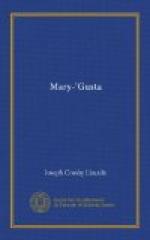Shadrach and I say yes. We ought to have said it afore but flesh is weak and we found it kind of hard to make up our minds to spare our girl all summer. But we know we ought to spare her and that it will be a splendid chance for her. So we say she shall go and we thank you more than we can say. She will need clothes and fixings to take with her and Shadrach and I wish to ask if you will be kind enough to help her pick out what she needs. Maybe Mrs. Wyeth will help too. It will be a great favor if you two will do this, Shadrach and I not being much good at such things. We will send the money and will pay for all.
Then came the breaking of the news to Mary herself. At first, after she could be made to believe the whole idea a perfectly serious one and realized that a trip to Europe—her dearest day-dream, even when a little girl, and the favorite play with the dolls in the attic at South Harniss—when she at last realized the opportunity that was hers, even then she hesitated to accept it. There were her uncles—they needed her so much in the store—they would miss her so dreadfully. She could not go and leave them. The united efforts of Miss Pease and Mrs. Wyeth could not alter her determination to remain at home; only a joint declaration, amounting to a command and signed by both partners of Hamilton and Company, had that effect. She consented then, but with reluctance.
The steamer sailed from Boston—Miss Pease’s civic loyalty forbade her traveling on a New York boat—on the thirtieth of June, the week after Commencement. Mary and Mrs. Wyeth attended the Commencement exercises and festivities as Crawford’s guest. Edwin Smith, Crawford’s father, did not come on from Carson City to see his son receive his parchment from his Alma Mater. He had planned to come—Crawford had begun to believe he might come—but at the last moment illness had prevented. It was nothing serious, he wrote; he would be well and hearty when the boy came West after graduating.
God bless you, son [the letter ended]. If you knew what it means for your old dad to stay away you’d forgive him for being in the doctor’s care. Come home quick when it’s over. There’s a four-pound trout waiting for one of us up in the lake country somewhere. It’s up to you or me to get him.
Crawford showed the letter to Mary. He was disappointed, but not so much so as the girl expected.
“I never really dared to count on his coming,” he explained. “It has been this way so many times. Whenever Dad has planned to come East something happens to prevent. Now it has happened again; I was almost sure it would. It’s a shame! I wanted you to meet him. And I wanted him to meet you, too,” he added.
Mary also was a little disappointed. She had rather looked forward to meeting Mr. Smith. He was her friend’s father, of course, and that of itself made him an interesting personality, but there was something more—a sort of mystery about him, inspired in her mind by the photograph which Crawford had shown her, which made her curious. The man in the photograph resembled Crawford, of course, but she had the feeling that he resembled someone else even more—someone she had known or whose picture she had seen. She was sorry she was not to meet him.




